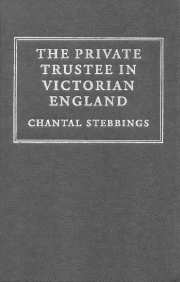Book contents
- Frontmatter
- CONTENTS
- Foreword by Lord Templeman
- Table of statutes
- Table of cases
- List of abbreviations
- The Trustee
- 1 Challenges to trusteeship
- 2 The relationship with the settlor
- 3 The relationship with the beneficiaries
- 4 The relationship with co-trustees and agents
- 5 Trustees in the commercial context
- 6 Transgressions by trustees
- Index
1 - Challenges to trusteeship
Published online by Cambridge University Press: 05 July 2009
- Frontmatter
- CONTENTS
- Foreword by Lord Templeman
- Table of statutes
- Table of cases
- List of abbreviations
- The Trustee
- 1 Challenges to trusteeship
- 2 The relationship with the settlor
- 3 The relationship with the beneficiaries
- 4 The relationship with co-trustees and agents
- 5 Trustees in the commercial context
- 6 Transgressions by trustees
- Index
Summary
When the concept of the trust was accepted and enforced by the Court of Chancery in the fifteenth century, Equitable theory and practical considerations placed the trustee at the very centre of the institution. The responsibility for the administration of the trust was placed in his hands; a task which, once accepted, he undertook with no remuneration, significant risk, and considerable effort. The jurisdiction of the Court of Chancery, and the acceptance of such a burden by the trustee himself, stemmed from the moral obligation attached to the transfer of the property to the latter. The creation of the trust and its effective management was both personally and legally a matter of conscience. The principal protagonists, namely the settlor, the trustee, the beneficiaries and the court, recognised it as such, a view understood and supported by the general public.
The undertaking of onerous duties possibly extending over many years for the benefit of one's family and friends was expected and accepted in early modern England. The ties of blood and friendship were strong. Family responsibility was essential in a society which was necessarily self-reliant, where fortunes, however modest, had to be preserved and passed down to later generations, and mortality was such that orphaned infants were not unusual and could only look to the prescience of their parents and the goodwill of their wider families. Moral duty, self-interest and practical necessity were conveniently united in the acceptance of the duties of trustee.
- Type
- Chapter
- Information
- The Private Trustee in Victorian England , pp. 3 - 20Publisher: Cambridge University PressPrint publication year: 2001

